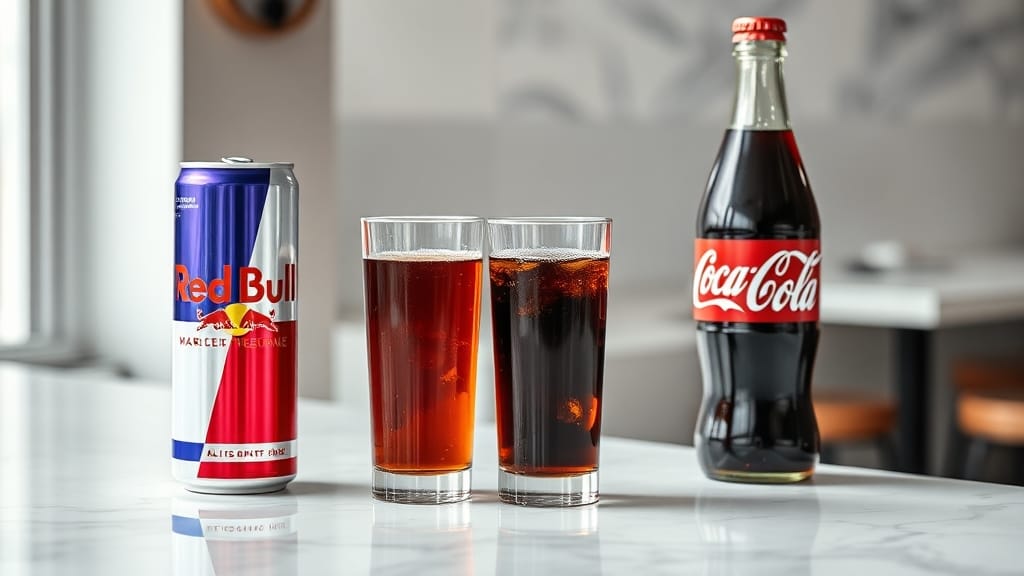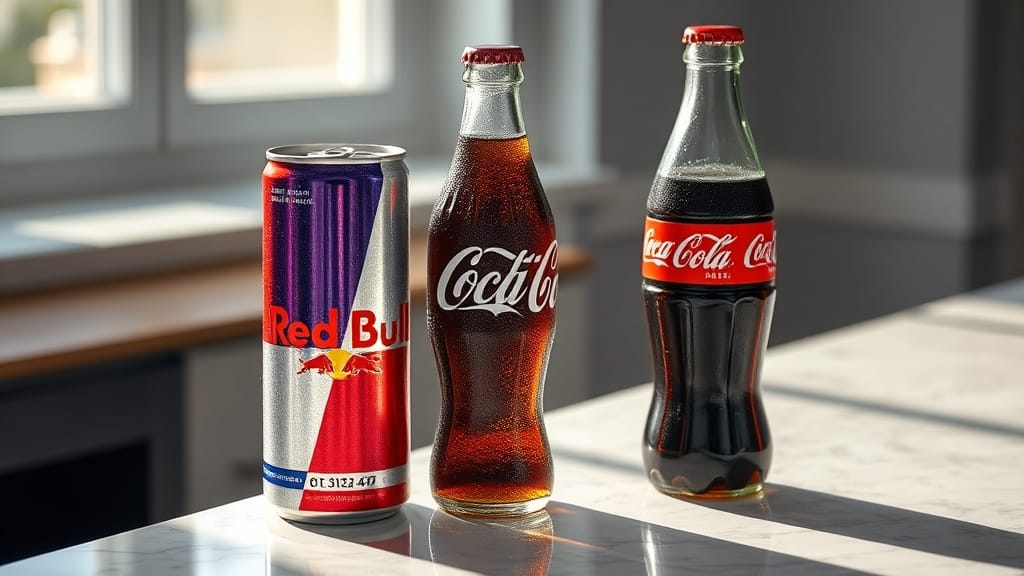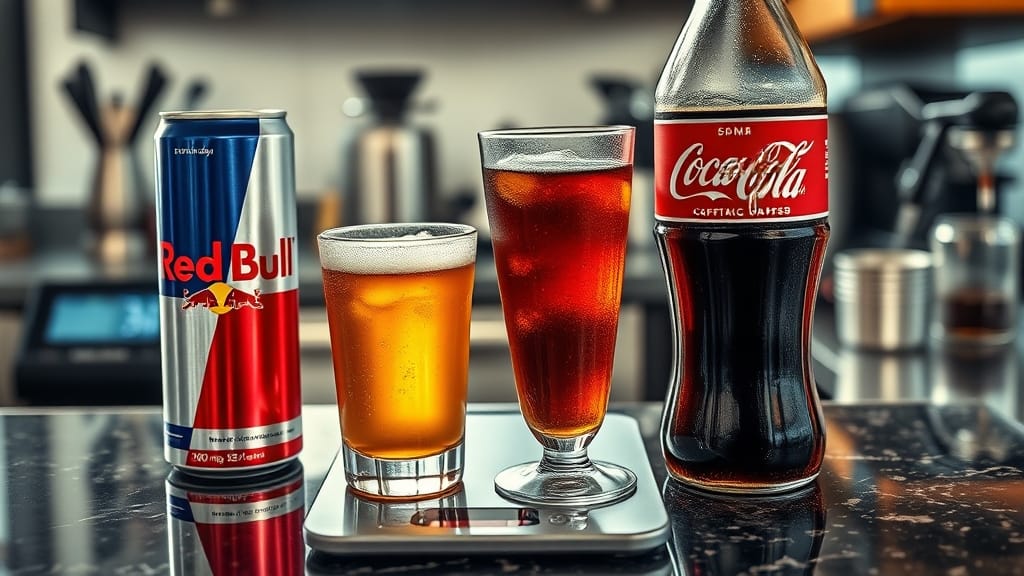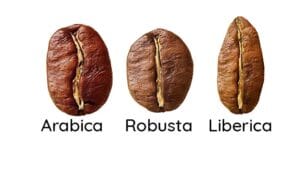Red Bull packs nearly three times more caffeine per can than Coca-Cola—75-80mg vs. 34mg—making its energy kick fiercer, like a jet engine next to a scooter. Despite Coke’s larger serving (330ml vs. Red Bull’s 250ml), Red Bull’s higher caffeine density (0.32mg/ml) means every sip works harder. Ultimately, Red Bull mixes caffeine with taurine and B-vitamins to sustain energy, while Coke pairs its milder buzz with sugary sweetness. Want the full breakdown of why these differences matter? Keep scrolling.
Caffeine Content Per Serving Comparison

While both drinks give a buzz, Red Bull packs more caffeine per sip than Coca-Cola. A 250 ml can of Red Bull delivers 75-80 mg of caffeine, while a 330 ml Coke has just 34 mg. Health experts advise adults to stay below 400 mg daily to prevent overconsumption risks.
For those craving stronger caffeine effects, Red Bull’s sharper kick might appeal, but Coke’s sweeter, smoother taste profiles win fans who prefer classic soda refreshment. The drinks cater to different vibes: one jolts energy seekers with fizzy citrus tang, the other soothes with caramel sweetness.
Caffeine content varies slightly by region, but the core difference stays—Red Bull’s dense buzz versus Coke’s mellow lift.
Whether chasing focus or unwinding, choice hinges on balancing that zippy, vitamin-spiked zing against bubbly, sugar-rush comfort. Both deliver freedom to pick your fuel, no gates, no rules.
Caffeine Concentration and Serving Volume

| Beverage | Caffeine per ml | Total Caffeine per Can |
|---|---|---|
| Red Bull | 0.32 mg | 80 mg (250 ml) |
| Coca-Cola | 0.10 mg | 34 mg (330 ml) |
| Diet Coke | 0.14 mg | 46 mg (330 ml) |
| Difference | 2-3x denser | Less than half |
Consumer preferences split here: thrill-seekers grab Red Bull’s punchier sips, while casual Coke drinkers coast on milder buzzes. Size matters, but density rules the buzz game. Brewed coffee surpasses both, delivering 95-165 mg of caffeine per 8 oz—nearly double Red Bull’s total—with no added sugars.
Additional Ingredients and Their Impact on Energy Levels

Beyond caffeine concentration, ingredients like sugar, taurine, and B-vitamins shape how Red Bull and Coke affect energy differently.
Though Coke packs over 50g of sugar per serving, Red Bull’s refined sugars spike faster—quick energy followed by crashes. Taurine, exclusive to Red Bull, works with caffeine like a sidekick, increasing exercise stamina and mental focus.
B-vitamins turn food into lasting fuel, a metabolic edge Coke skips for its simpler sugar-caffeine combo. Flavor improvements, like fizzy citric acid, make both tasty but don’t power your brain.
Red Bull’s energy cocktail targets endurance; Coke’s quick sugar rush fades fast. Want freedom from crashes? Check the label—ingredient functions decide if you’ll soar or slump mid-day.
Frequently Asked Questions
Are Red Bull or Coca-Cola Banned in Any Countries?
Red Bull regulations exist in some nations due to health concerns, with past bans in Denmark and Norway. Coke restrictions are rare, historically tied to political disputes in Cuba or North Korea. Both comply with EU and FDA standards.
Can Mixing Red Bull With Alcohol Be Riskier Than Coke?
Like a chemical tempest, combining Red Bull with alcohol disrupts alcohol interaction, heightening health risks via masked intoxication and cardiovascular strain—unlike lower-caffeine mixers—prompting riskier behaviors that clash with autonomy-seeking lifestyles.
Does Caffeine Degrade in Red Bull or Coke Over Time?
Caffeine stability in Red Bull and Coke remains high if stored properly. Degradation over time is minimal, though storage conditions—like temperature extremes or exposure to light—might marginally affect other ingredients more than caffeine itself. Manufacturers prioritize shelf-life consistency.
Do Red Bull and Coke Have Different Long-Term Health Impacts?
Energy drinks like Red Bull may increase heart-related risks due to high caffeine and stimulants, while soft drinks such as Coke, with lower caffeine but high sugar, contribute to metabolic disorders over prolonged consumption.
Are There Caffeine-Free Versions of Red Bull Available?
Juxtaposing energy drink comparisons and caffeine alternatives, Red Bull lacks commercially available caffeine-free versions, unlike Coca-Cola. DIY experiments exist to remove caffeine from Red Bull, but these pose safety risks and remain nonstandard options.
References
- https://foodstruct.com/nutrition-comparison/coca-cola-vs-redbull
- https://www.govinfo.gov/content/pkg/GPO-STYLEMANUAL-2016/pdf/GPO-STYLEMANUAL-2016.pdf
- https://www.vidrate.com/blogs/news/caffeine-content-for-some-of-the-most-popular-drinks-revealed
- https://www.dshs.texas.gov/sites/default/files/uploadedFiles/Content/Prevention_and_Preparedness/schoolhealth/shpguide/Schoolhealthservicesguide/school_nurse_emergency_care_course.pdf
- https://www.sdera.wa.edu.au/media/2741/d-cc-yr-7-drug-mod-2-caffeine-and-energy-drinks.pdf
- https://novum.coffee/en/caffeine-in-coffee-a-comparison-with-table/
- https://goldencava.com/blogs/coffee/caffeine-in-red-bull-vs-coffee
- https://en.wikipedia.org/wiki/List_of_energy_drinks
- https://www.healthline.com/nutrition/red-bull-vs-coffee





